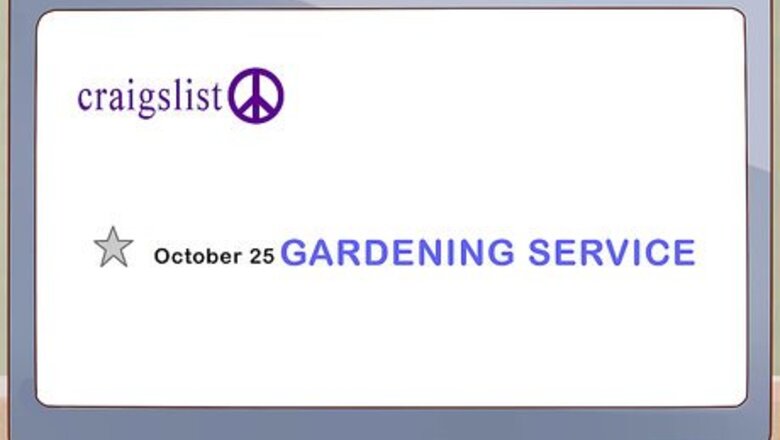
views
Doing Odd Jobs In Your Neighborhood
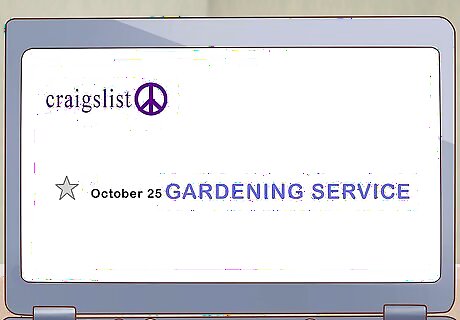
Advertise your services. Build your own website or post on online pages such as Craigslist. Specify in your advertisement what types of jobs you can do (home repairs, plumbing, electrical work, yard work, cleaning etc.), what you charge, and when you are available. Provide multiple ways to contact you. If you can be reached by both phone and email, you might have a better chance at getting work.

Build your potential customer base. Speak to nearby friends and neighbors first. Tell them that you need money and are willing to do light housework and yard work in the area. Ask them to tell their friends and neighbors too, and recommend your services. Your neighbors and friends may very well end up being your first customers. Be sure to tell them to spread the word that you do good work when you're finished.

Charge reasonable rates for your work. The main reason someone might consider hiring you over a professional service is that you're a lot less expensive. Ask for a small amount of money that you can live with, rather than a large sum. A good way to estimate what to ask for is to set a low hourly rate, say $8 or $10. Also, prorate your work to the nearest half hour. In other words, if you work for 6 hours and 33 minutes, just bill for 6 hours and 30 minutes. That keeps things simple.

Act professionally. Dress in clean clothes and smile when people answer their doors. Offer a handshake when you introduce yourself. Make eye contact. Be sure to describe exactly what types of services you offer, whether its small home maintenance, yard work, cleaning etc. Be willing to do jobs on weekends and evenings. Return calls and job offers quickly and promptly.
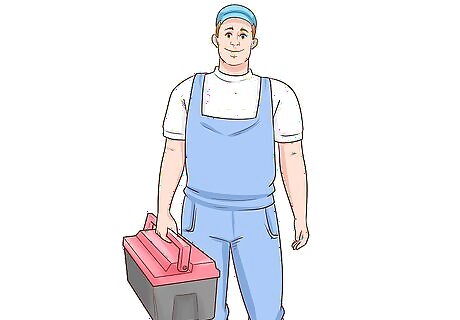
Bring your own equipment. If you have specialized equipment you can bring, such as a toolbox for house repairs or a rake for leaves and grass, bring it with you. Heavier items like ladders and lawnmowers can be left at home, but be sure to mention you have access to your own. Don't accept jobs that you don't have the equipment to complete.
Finding Short-Term Jobs

Think about what your skills are. You might be able to find a short term job more easily if you have certain skills. Bookkeeping and accounting jobs are often short term or temporary. If you have skills as a bookkeeper, you can often find a well paying position on a short-term basis. Offices and human resource departments often look for part-time workers when they have an increase in paperwork or filing. If you have tech skills, some firms or websites may hire on a short-term basis.

Check the local listings for short-term jobs. The online marketplace Craigslist features an “ETC” category under the Jobs heading local newspapers also often carry advertisements for quick, temporary work. Check everywhere you can and think about what you're able to do. Take a job as a sign waver. All kinds of businesses hire sign wavers to stand outside for 8 or 10 hours and wave a large sign at passing cars. Used car lots, payday loan stores, and furniture stores in particular use this marketing technique and often pay in cash at the end of the day. Help out with event work. Browse listings for people and small businesses who need help setting up, running, and tearing down booths for local events like farmer's markets and street fairs. These jobs often start early in the day and often pay the same day. Be prepared to do anything from construction to running a booth.

Participate in studies or surveys. This isn't a reliable way to make a lot of money, but if you're just a few dollars short, it can make up the difference. A Google search will help you find some online surveys. Be sure you qualify for the study before you apply. For example, you won't want to apply for a study that is looking at the effects of smoking if you aren't a smoker. Apply in person to expedite the process. In the case of some surveys, you'll be able to show up and do a paid survey right then and there. Studies usually last longer, but may provide compensation before the end of the study period.

Join a temp agency. Temporary work agencies place thousands of employees with daily work. If you have specialized work skills or previous experience in a field, you might have very good luck temping. There are a number of tips to help you get started with an agency: Visit the agency. Tell them you want to work, and follow their instructions. There will usually be an application to fill out, followed by an interview where you go over your work history and qualifications. Bring a resume with you. It will help the temp agency sort out what types of jobs you are qualified for. Dress for an office environment. Business dress shows you are looking to be successful and will fit in a professional setting. Meet your agent. He or she will work to find jobs for you every day. Try to be pleasant and get along with your agent; it could help your chances some. Take any job you're offered. Temp agencies can't work miracles; they don't find work for every temp employee every day. If your agent finds work that you can do and offers it to you, take it immediately. Sometimes, a temp in a longer-term contract can get hired on as a regular employee, so always treat it like a “real” job.
Selling and Reselling
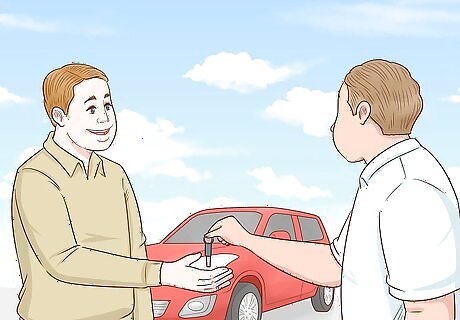
Think about selling your car. This isn't a practical step for many people, but if you're lucky enough to live somewhere you don't need a car to get to work or the grocery store, you're sitting on a huge mound of cash in the driveway. There are some helpful steps to complete this process: Gather your car's information. Find the title and registration, maintenance receipts and records, and a car history report. Also know the features of your car (CD Player, seat controls etc.) Having regular receipts and records for oil changes and routine maintenance can show that your car was well cared for and can help you get a good offer. Set a price for your car. To find the right price, you can look up the value of your car with Kelly Blue Book or look in the classifieds section of your newspaper to see what price cars like yours are selling for. Advertise the car online and in newspapers. In your ad specify the model and year of the car, its features, its true condition (if it is in need of repairs be honest), your asking price, and acceptable forms of payment. Include lots of photos and multiple ways to contact you.
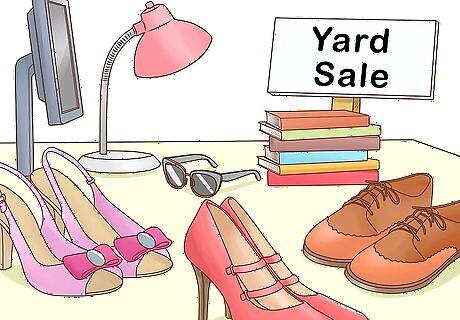
Have a yard sale. Advertise it for free on Craigslist, or for a small fee in the local newspaper. Clean and organize everything you intend to sell, and lay it out in front of your house or apartment on the morning of the day of the sale. This approach works best for people who haven't previously sold things for cash out of necessity, and still have a lot of items to sell. People are more interested in bigger yard sales. Price everything slightly high, but be willing to haggle down. Most yard sale items will reasonably sell for 1/3 to 1/2 of the original price, if the item is in good condition. Keep your prices in $.25 intervals to keep change handling simple. To make up the difference, try to feature some bigger items, like furniture and exercise equipment, that you can get a bigger chunk of change for. Place these items at the end of the driveway or yard to lure in buyers. Many neighborhoods have a coordinated yard-sale day. It is a good idea to hold your yard sale during this event because it will draw in a large crown of potential buyers.
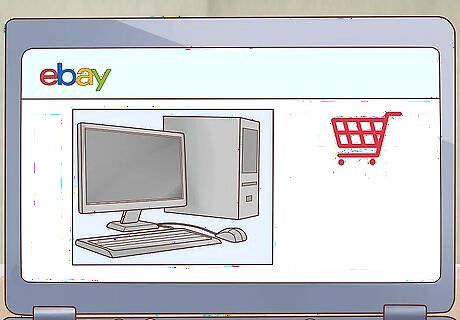
Sell your belongings online. There are two basic ways to do this if you need to turn a quick profit: Craigslist and eBay. On Craigslist, post your item for sale in the appropriate section of the site. Be sure to post pictures if you can; people often don't bother with listings that don't have photos attached. Use the word “firm” if you refuse to haggle on the price; use “OBO” to indicate you might be willing to go down on it a bit. On eBay, you can set various time and purchase options, which may have fees attached to them. If you choose to sell it at a fixed price with the Buy It Now option, you will have to pay a flat fee of a couple dollars in addition to a percentage of the sale price. Buy It Now allows you to control your selling price. If you choose to sell your item at auction, choose a period of time the auction will be active. Sunday evening is said to be the most lucrative night of the week for auctions by frequent eBay sellers.
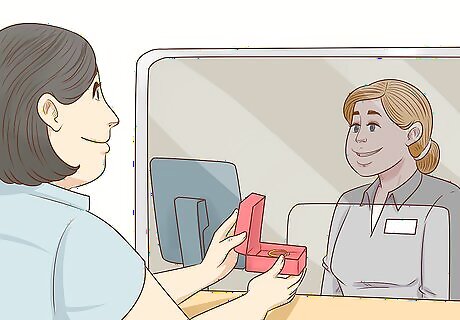
Sell to a pawn shop. Pawn brokers are people who will pay cash for just about anything you own that isn't disposable or perishable. Pawn brokers tend to pay very low amounts and won't haggle. Bring your items with you to the pawn shop. Most pawn shops keep short hours for security reasons, so go before 4PM to be sure you get in. Decide whether or not to accept the offer. Expect to get $60 for a $500 bicycle, and on down the line proportionally. In most cases, you should only visit a pawn shop if you absolutely need money right now and have no other options available as you won't get a good value on your items.

Resell to collectors. There are collector's markets for just about everything with any cultural significance, from commemorative plates to video games and old toys. If you arm yourself with knowledge, you can make a killing buying items for cheap and selling them to collectors at a profit. Specialize in one type of collectible. You might specialize in retro toys or specialized glassware. Start by seeing what collectibles you already own and build from there. Know your subject. Do the research to find out what an item in good condition looks like and is worth. Know which items are commonplace or super rare. Rare items will get a better price. Visit cheap places. Yard sales and thrift shops are your best friends as a collectables reseller. Use computer resources. Websites that specialize in collectibles can help you to gauge what collectibles are selling for in your area. Sell online. You'll often get a better price online than you will selling to a local collector, and this can widen your customer base. Get to know dealers and insiders. These people can be great connections for you to advertise your collectibles and get to know vendors who can help you sell your items.
Using Unorthodox Approaches

Perform on the street. If you're lucky enough to own an instrument and talented enough, busking is the art of musical street performance. A good busker in a busy spot can make a nice little pile of cash in an hour or two of playing. The following are some helpful tips for busking: Get permission. Some cities and communities have ordinances that require a permit or fee for street performance. Choose a good location. Avoid areas where there are other street performers but still have high traffic. Choose busy downtown areas in safe locations as a starter. Choose your repertoire carefully. A good time of year to busk is during the holiday season. Jazz and popular music are also successful themes. Be polite to your audience. Be warm and friendly with everyone who crosses your path. Smile and nod whenever you make eye contact with anyone.
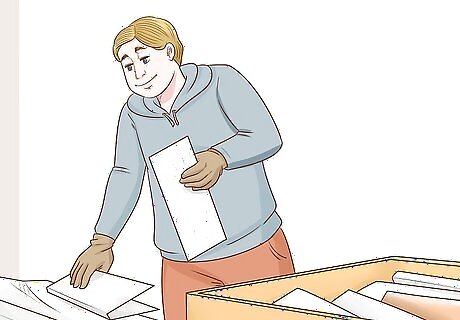
Collect scrap metal. Iron, steel, and especially copper can be sold to scrapyards by the pound. To make a significant amount of profit, you'll need to bring in quite a few pounds, so be sure you have a vehicle with space for the metal. Look around abandoned lots and derelict buildings for pipes and metal fixtures. Junk bins outside tech and office firms may have bunches of wire or other components that can be sold as scrap. Be very careful if you collect scrap. Wear heavy gloves, bring a partner, and don't hunt for scrap at night. Don't steal or strip metal from anything that's still in use. Search neighborhoods in the morning before garbage collection. You can often find items that can be used for scrap or fixed up and sold.
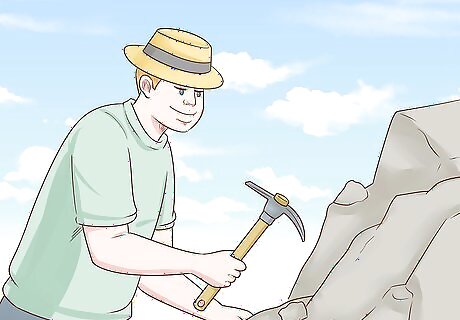
Go rock hounding. There are guidebooks available in most areas that show where valuable rocks can be found. Fossils, geodes, and semi-precious gemstones are all widely available in some areas. Keep in mind though that this may take time to find a collection and might not be a fast solution to your money problem. Learn different gemstone grades. If you're hounding for semi-precious gems, remember that coloration and size can sometimes make them quite valuable. Bring a shovel or spade, gloves, a hat, and a pail or bucket. Very often, to find the better-quality rocks and fossils, you'll have to dig down into the ground a little bit. Be sure this is legal where you are; most places marked in a guidebook should allow it. Be careful to stay off of private property, including mining claims. Sell your haul to a specialty store. You won't get a whole lot, most of the time, but it's next to impossible to sell raw stones online.

Sell plastic bottles for money. It's possible to collect bottles from other people's recycling and sell them for money. You'll have to collect quite a few of them before you can make a profit, so be prepared to put some effort into this method. You'll also have to find a national recycling buyer that purchases plastic bottles in bulk. A simple Google search should help you find companies that you can work with.
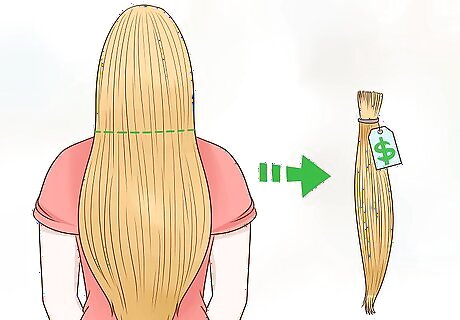
Sell you hair. Believe it or not, there is a market for your hair. If you have "virgin" (non-dyed or treated) lengthy hair, you can earn quite a bit of money for it. Your hair is an outgrowth of what goes into you, so if you eat healthy and don't smoke, you can sell your hair for a premium. An online tool exists to tell you how much your hair is worth.




















Comments
0 comment